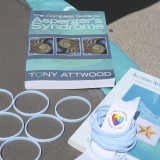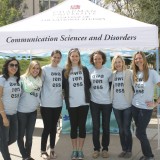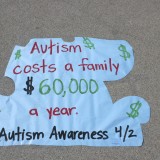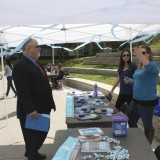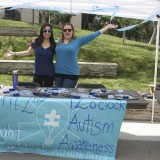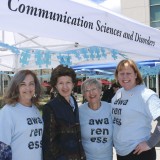Chapman University Kicks Off Autism Awareness Month
April 8, 2014
On April 2nd, 2014, students, faculty, and staff of the Communications Science and Disorders program and the Counseling and School Psychology Program within the College of Educational Studies handed out blue wrist bands in front of the Attallah Piazza at Chapman University. The goal of the volunteers was to create awareness about autism, its effect on families, and its growing prevalence in the United States, as part of Autism Awareness Month. Volunteers at the Communications Science and Disorders tent also handed out pamphlets, materials, and resources regarding autism to curious students who visited the tent.
The volunteers at the Communications Science and Disorders tent all dressed in blue in a show of solidarity for those that are affected by autism and the ground along Attallah Piazza were taped down with posters informing campus students about the facts of autism.
- Autism now affects 1 in 68 children and 1 in 42 boys
- Autism costs a family $60,000 a year on average
- Boys are nearly five times more likely than girls to have autism
- Autism is the fastest-growing serious developmental disability in the U.S.
(sources: autismspeaks.org)
Students and families that that are interested in learning more about autism, and resources that are available can visit the Autism Speaks website for more information
The College of Educational Studies is dedicated to educating students on autism disorders through the Communication Science Disorders and Speech Pathology (CSD), Special Education, and School Psychology programs. These programs train future educational professionals on best practices in working with students with autism spectrum disorders.
The College of Educational Studies has been approved by the California Commission on Teacher Credentialing (CTC) to offer the Educational Specialist Credential in Moderate and Severe Disabilities. Students receiving an Educational Specialist Credential will be able to teach, and make adaptions for students with autism spectrum disorders within grades K-12 and adults up to age 22. The Education Specialist Programs prepare candidates to serve as special education teachers in K-12 public schools in primarily, inclusive, resource, and when necessary, special day class settings. The Education Specialist Credential (Special Education) programs are embedded within the Master of Arts in Special Education program, although the Master of Arts in Special Education can be completed without obtaining a teaching credential.
The Educational Specialist (Ed.S.) Program in School Psychology and MA in School Psychology allows student candidates who wish to work as school psychologists with children from preschool through high school. The curriculum teaches a variety of tasks including assessment for intervention, mental health counseling, behavior management and consultation with teachers and parents. The Ed.S school psychology program at Chapman is fully approved by the National Association of School Psychologists
- Communication Sciences and Disorders Director Judy Montgomery, Ph.D., at the CSD autism awareness tent.
- Dean Donald Cardinal, Ph.D., visits the Communications Science and Disorders autisim Awareness tent




